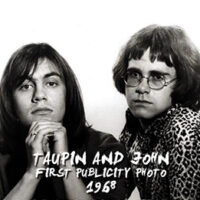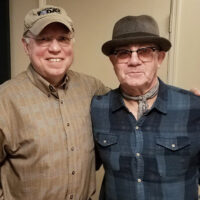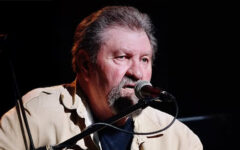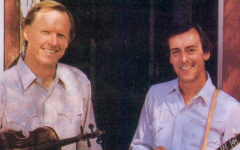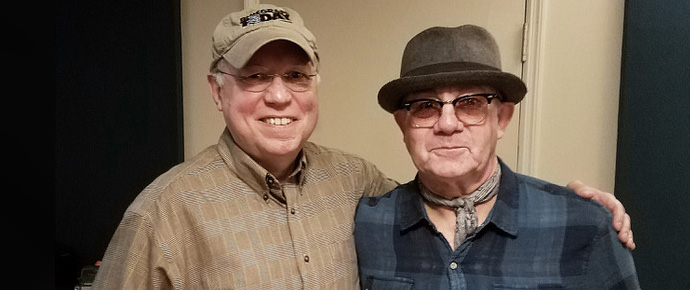
Terry Herd with Bernie Taupin in Nashville (April 2018)
The late Dixie Hall once said, “it all begins with a song,” and when it comes to great songs and songwriters, no one has the track record or catalogue of Bernie Taupin. 35 Gold and 25 Platinum records, 30 consecutive US top 40 hits, more than 255 million records sold including the largest selling single of all time, Candle In The Wind, which to date has sold over 33 million copies.
The songs are as iconic as the man who wrote, or co-wrote them with his friend of more than 50 years, Elton John. Songs that for many of us would become the soundtrack of our youth and early adulthood. The titles alone invoke melodies that magically start playing in your mind the minute you hear them: Rocket Man, Honkey Cat, Crocodile Rock, Levon, Daniel, Tiny Dancer, Your Song, Bennie and the Jets, Goodbye Yellow Brick Road, Saturday Night’s Alright for Fightin’, and the list goes on.
But what does any of this have to do with bluegrass music? Plenty.
Growing up in post war England, Taupin became well versed in all forms of music, including bluegrass. In fact, one of his songs Please, from the mid-nineties was hand picked for Rhonda Vincent and Dolly Parton, to join a who’s who of his favorite Americana and country artists on a new project called Restoration, released Friday April 6, together with a companion project called Revamp, cast by John. Vincent and Parton’s cover of Please is a bonafide bluegrass track.
Now 67 years on, Bernie Taupin is still going strong, creating music and dimensional artwork at his ranch in California, when he’s not out riding the range or tending to the chores, that is. He lives a private life, and isn’t often seen in public.
I had the rare opportunity to sit down with him recently, together with Rhonda at her studio in Nashville, to talk about the new Restoration project, as well as his incredible musical journey, and his love of bluegrass music.
Q: Welcome to Nashville Bernie, I know you’re long time friends with Rhonda, tell me how you two first met.
Taupin: To tell you how I know Rhonda Vincent you’d have to go back probably ten years, maybe even more. I was familiar with her because like anybody who’s interested in any genre of music, you kind of stumble into things and maybe I heard something on the radio… I know I acquired a couple of her records and the thing that appealed to me most was the fact that she wasn’t cutting any corners. She was the real deal, and I think that’s what caught my ear. I appreciate musicians that keep tradition alive. It is very easy to water things down these days and make them applicable to modern times, but the thing that just knocked me out about Rhonda, she was maintaining tradition with the true values of bluegrass. There was something she was doing that made it real palatable, and I don’t mean that in a derogatory sense. I mean that it just caught your ear. It was that traditional high lonesome sound.
Also you have to bear in mind as a songwriter, the songs were just tremendous… they just really struck a chord with me.
It happened that Rhonda was playing at a place called the Maverick Saloon near my home in Southern California, and I made a point of getting in touch with her, and we had dinner prior to the show, and then I went to see her and I was totally sold. From then on we kind of became fast friends.
Q: How was it that bluegrass music found you all those years ago, and who were you listening to at the time?
Taupin: OK well I think you go have to go way back, because people have this misconception that people who are brought up in other countries aren’t exposed to the music of other countries. And you also have to realize that back in England in the early ’60s, country music was really popular. There were things on the radio that were big hits in England… like Roger Miller and Jim Reeves. I remember as a kid Distant Drums by Jim Reeves was a number one hit for almost 6 weeks, Little Jimmy Dickens’ May The Bird of Paradise Fly Up Your Nose, not the greatest stuff mind you, but I think it was because of the English sensibility of folk music that it tied in somehow.
I got lucky because I came from a very rural area of England, and there were some armed forces stations nearby with American servicemen who would bring in music from the states that we weren’t privy to in those days. Now I don’t know if this is fundamentally bluegrass, but the first ones that really caught my ear were the Louvin Brothers. Now that straddles the line on bluegrass, but there were certainly elements of bluegrass to it, the fiddles and mandolins, that really really appealed to me. Lefty Frizzell and the Louvin brothers are the first people I remember hearing.
I remember thinking this music is really cool and the thing is, it obviously wasn’t a hip thing to be a part of at a time during the advent of the beat groups, the Beatles and the Stones and so on. I was sort of a closet fan of country music and bluegrass. So when I eventually came to the states in the early ’70s, it gave me the advantage to really explore this kind of music and I discovered people like Bill Monroe, The Osborne Brothers, Ralph Stanley and The Stanley Brothers, Flatt and Scruggs… and I just immersed myself in it. It’s music that is really, really appealing to me, but the guy that became my absolute hero was definitely Jimmy Martin.
Q: What was it about Jimmy Martin that spoke so strongly to you?
Taupin: If you put all the pieces together you got a real true bluegrass giant in my opinion. I think bluegrass obviously breeds characters, and you only have to go back to the history books to see those guys – everybody from Bill Monroe to Ernest Tubb. Jimmy Martin had all those qualities and he was just an extraordinary player and singer… I mean his voice was just incredible. He defined that high lonesome sound, for me anyway – I mean we’re talking about personal opinions here, but yeah, when Jimmy left us, the world was a darker place.
Q: It’s amazing to hear you speak about Jimmy Martin and bluegrass music in such a reverent way, after all most of us grew up listening to your songs which were anything but bluegrass. Have you ever thought about writing a bluegrass song?
Taupin: I don’t even know what that constitutes. I mean I think any good melodic song can probably be made into a bluegrass song, I don’t think you have to consciously write in that vein, if it’s a good song, again it could be made into a bluegrass song. For instance, somebody a couple years ago turned me onto a group called Iron Horse. They did a bluegrass version of Rocket Man which is fantastic, and you can see it on YouTube, and it’s really good. Now, If there was ever a song that I would never have thought could be made into the bluegrass style, that would be it, and they knocked it out of the park. Years ago there was a bluegrass album done of all our songs, so it’s not really an unusual idea, but to actually say can you consciously write a bluegrass song? I’m not sure I know what that is and how to do it.
Q: Revamp and Restoration are two new projects out this week, with a who’s who of guest artists. Elton John cast the line-up for Revamp, and you, Restoration – which is largely a country music and Americana line-up, including a bluegrass track by Rhonda Vincent and Dolly Parton. I know bluegrass fans will be thrilled to hear it.
Taupin: The thing about the Restoration album, I was absolutely adamant we have a bluegrass track on there and if we were going to have a bluegrass track, it had to be genuine. I didn’t want it to be watered down, I wanted it to be the real dea,l and I felt like there’s only one person to do it and that’s Rhonda. The fact that we got Dolly to join in was the icing on the cake.
Q: We’ve spoken a lot about bluegrass music today, but your depth of knowledge of other genres is mind boggling to me.
Taupin: I’ve always had a love for all genres of music. I’m not a huge fan of contemporary pop music, not to say there’s anything bad about it, it just doesn’t do for me what jazz and blues and country and bluegrass do. There’s something intrinsically organic about those genres that move me and I’m infinitely proud of the fact that I’ve been influenced by all genres of music, as I say, notably the one that really doesn’t influence me that much is classic pop. Which we seem to be purveyors of – which is kind of interesting. It seems kind of ironic, but I don’t listen to pop music. [Laughter…] It sometimes leaves me at a loss for words. But no, there’s a place for everything and there’s good and bad in everything. I’m sure you know there’s bad bluegrass in the same way as there is great bluegrass. It’s an incredibly intricate musical style.
There’s a wonderful documentary, going back to Jimmy Martin, of him grilling one of his banjo players in a trailer and it’s fantastic. I mean it’s a bit like Chuck Berry grilling Keith Richards on how to do the riff for Johnny B. Goode. Bluegrass is just an amazing, amazing style of music. So when I see Rhonda on stage playing that mandolin, it just absolutely takes me somewhere else, I mean she’s an extraordinary musician, an extraordinary singer, and she has a remarkable band. I’ve seen them several times.
Q: Do you have a favorite song recorded by Rhonda Vincent?
Taupin: Yeah, she knows what it is. It’s called The Last Best Place. I met the kid that wrote that song, Steve Leslie. He came up to me and he was very sweet – but yeah, when I go I want that song sung at my [funeral], or whatever they’re going to do with me when I die. So Rhonda, if you’re still around I want you to sing that for me.
Rhonda: I would be honored.
Editors Note: More highlights from Terry Herd’s interview with Bernie Taupin and Rhonda Vincent can be heard on his nationally syndicated radio program Into The Blue, which airs Sunday evening, April 15, 2018 at 9:00 p.m. (CDT) on WSM AM 650 in Nashville, or online at wsmonline.com, and on more than 130 other stations across the US.
Bluegrass DJ’s can download the new track, Please, at AirPlay Direct.



